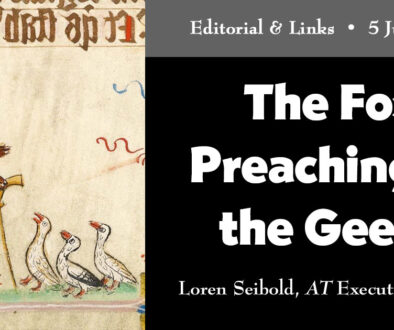Book Review: Saying No to God
Saying No to God, by Matthew J. Korpman. Published by Quoir Press, Orange, California, 2019. 358 pages.
Reviewed by TJ Sands
When was the last time you said “no” to God? Is even the thought of that question preposterous to you? Or am I a heretic for even asking?
Rarely do I turn the last page of a book and immediately start planning for my next read through. This was my experience after finishing Matthew Korpman’s debut book, Saying No to God: A Radical Approach to Reading the Bible Faithfully. This is the first book I have read that covers such a wide array of controversial and pertinent topics about the Christian faith, in such a succinct way. Whether you label yourself a conservative or a liberal Christian, or anywhere in between, you are sure to come away from this book feeling paradoxically challenged and encouraged.
Contrary to what the book’s title might lead you to think, Korpman holds a high view of Scripture and quotes from it constantly. Yet he doesn’t shy away from tackling many of the long-held views of traditional Christianity. While this may make some of my conservative friends a bit nervous, we should remember Ellen White saying “There is no excuse for anyone in taking the position that there is no more truth to be revealed, and that all of our expositions of Scripture are without error” (Counsels on Sabbath School Work, p. 34). Statements like that have made me decide that I want to come to Scripture with a greater sense of wonder and curiosity. My reading of Saying No To God was a tremendous step forward in that goal.
The author starts and concludes the book with parables of his own making. The book is composed of three main parts: Confrontation, Realization, and Incarnation. Korpman has the skill of making substantial theological topics accessible and readable. His friendly and approachable personality shines through. Reading Saying No To God feels like a journey, or, as he says, “an expedition into the mystery of what sort of relationship God is seeking with His creation.”
Before Korpman gets to the Bible stories we all (think we) know and love, he addresses the topic of doubt. Throughout my Christian journey, I have learned to grow more comfortable with the tension that doubt brings. For me, doubt is the dance partner of faith. I have learned that I can still trust God while entertaining doubts, because, as Korpman says, “trust is not the same as certainty.” He says, “It is an unavoidable truth that we inhabit a post-modern and post-certain world, and many churches desperately as such find themselves fighting the forces of skepticism and doubt. Yet, this is a losing battle. For no matter how much one tells you to believe, doubt will not magically disappear unless one is intellectually dishonest.”
Intellectual dishonesty runs rampant within Christianity. I am naturally a doubting Thomas. I have been shamed on numerous occasions by well-meaning Christians, but I have learned to embrace the tension and seek God’s hand through the doubts. I just about stood up and clapped my hands when I read the following near the end of the book’s first chapter: “For far too long, the church has looked at Christians who doubt as either a threat or problem to solve, rather than what they have the potential to be: a blessing.”
What follows are fresh twists on some well known heavy-hitters from the Bible such as Abraham, Jacob, Job and Moses. Even if you think you’ve gone over the Bible stories enough times that you think there is nothing more to find, you are in for a surprise in chapters 2 through 7.
Part 2 is a sort of intermission, where the author presents a concept he names “Pyrotheology.” Without spoiling the surprises that await, I will offer you this short quote: “I doubt that every Evangelical- or Conservative-leaning Christian who reads this far will suddenly take everything I’ve written and change their long-held views. I would hope that at the very least, these past chapters will encourage you and others to open your Bibles once again and read through the biblical text with new eyes. Some of you will think that I’ve opened Pandora’s box, while others will believe that I’ve cracked open Heaven’s gate. Whichever way you view this material, as welcomed or uneasy, it is without a doubt controversial in our polarized religious context.” This chapter is the glue that connects Part 1 and Part 3.
In Part 3, Korpman puts the gloves on and systematically demolishes many of the arguments and biblical misunderstandings that have led to prejudice, patriarchy, homophobia, violence, hell and exclusivity—which is, sadly, what many modern people think of when they hear of biblical Christianity. It has been my experience that Christians, even pastors, are often willing to dodge these more difficult-to-interpret texts of Scripture. In chapter after chapter, Korpman shines a spotlight on many oft-avoided topics. He says that “one of the purposes of this book is in part to reorient us in how we read and approach the Bible as both an ancient book and as living scripture,” and that “every dark crag and dusty crevice of Scripture will need to be examined, no matter how painful, confusing and disturbing.” Regardless of which side of the fence one might be on concerning these topics, Saying No To God is a call to look in the mirror and ask important questions about the teachings of Jesus.
Saying No To God ends with a call to action. Korpman’s practical wrap-up: “We cannot simply declare what God is, without also transforming ourselves to embrace what God is. If God loves others, we cannot simply acknowledge it like some detached objective fact, but must embrace it and more importantly, incarnate it into our lives. Fighting God is not an intellectual exercise, but denotes something physical and intimate.”
Matthew Korpman’s genuine honesty shines through from the opening chapter until the book’s end. He is open and forthright about his own struggles and doubts about God and the Bible, but he doesn’t just present problems. Solutions, and a way forward, are given with every topic he puts under the microscope. While the book’s title is meant to be polarizing and attention-grabbing, Korpman is not advocating a view that allows for our own human desires to dictate when or how we say no to God. He writes that “the key to arguing successfully with God is by only being motivated to fight for reasons related to God’s own character.” Concerning Scripture, he believes that we must “give room for the Spirit to breathe life” into our understandings, preachings and theologies.
Whether you are looking to be challenged or blessed, you will find both within the pages of Saying No To God. I feel that I am a better, and more informed Christian after reading this book and I am looking forward to my next experience between its front and back covers.
 TJ Sands is a pastor in the Oklahoma Conference. He and his wife, Sarah, live in beautiful Edmond, OK.
TJ Sands is a pastor in the Oklahoma Conference. He and his wife, Sarah, live in beautiful Edmond, OK.




